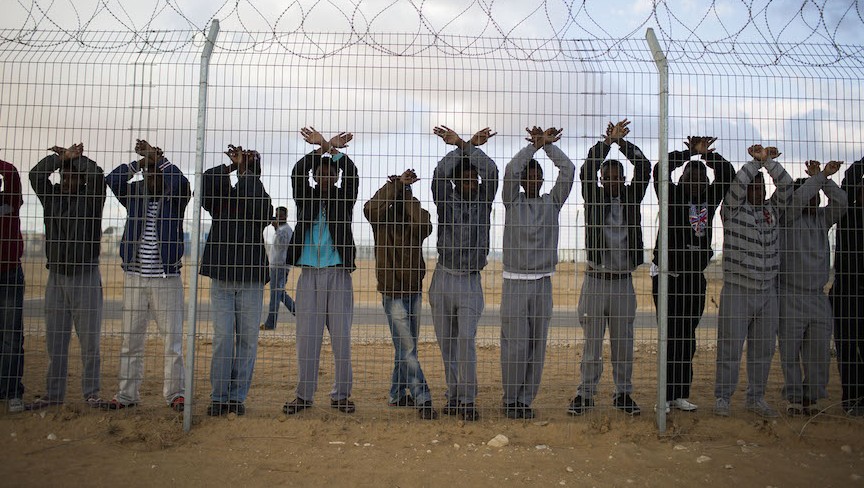Holot will shut down after four years; 480 detainees to be released with geographic restrictions on where they can live and work
By Melanie
Holot, an open air detention center where Israel housed illegal migrants largely from Eritrea and Sudan, will close its gates at 11:59 p.m. on Monday, the Population Immigration and Border Authority announced. The closure is part of the government’s plan to deport thousands of African asylum seekers who entered Israel illegally.
In 2014, Israel completed construction of a 242-kilometer (150-mile) electronic fence along the border with Sinai. Illegal immigration through Sinai dropped to just 11 cases in 2016, and 0 in 2017.
Kewane, 34, an Eritrean asylum seeker who declined to give his last name, was released last Thursday from Holot, after spending more than two months at the detention center. He said the group released with him spent 12 hours in a waiting area and were told to leave Holot at 7 p.m.. No one provided transportation.
Some asylum seekers were only released after 11 p.m. Sunday, and spent the night sleeping in a bus shelter outside of the gates of the detention center, Kewane said.
Kewane, who has already found a place to live in Haifa, will return to his Tel Aviv apartment to collect clothes and other belongings, since he can no longer live in the city under the conditions for his release.
“I’m angry, but mostly I’m just so happy about being out of there,” he said by phone from Haifa, over the voices of friends and the sound of Eritrean music playing in the background. Though his status is uncertain, Kewane has a temporary visa and is looking for work in a restaurant or hotel in the area.
Kewane is active with the political group Eritreans United for Justice, an international group of Eritreans in the diaspora trying to overthrow Eritrean dictator Isaias Afwerki, and he faces imminent danger or death if he returns to his native country.
Sabine Hadad, the spokeswoman for the Population Authority, said more than 20,000 asylum seekers have left Israel in the past years. They left either under the “willing deportation” with a cash grant of $3,500 and ticket to Uganda or Rwanda, through a resettlement program to a third country such as the United States or Canada, in coordination with the governments of those countries, or on an individual basis.
Hadad said the Population Authority held a marathon of hearings and determined that 300 asylum seekers do not meet the requirements for release, and will be imprisoned at the nearby Saharonim prison if they refuse deportation. Another 480 asylum seekers, like Kewane, were released from Holot with temporary visas.
Since the beginning of 2018, 398 Eritrean and 49 Sudanese asylum seekers have agreed to leave with the cash grant. Of the migrants who departed, 102 returned to their countries of origin and 104 went to Uganda or Rwanda. The remainder were resettled in other countries, though the Population Authority declined to clarify where.
Israel has “willingly deported” approximately 4,000 asylum seekers over the past four years, according to UNHCR, which has expressed concern over the program.
The United Nations High Commission on Refugees is in talks with a number of countries to resettle some asylum seekers from Israel in exchange for Israel giving permanent status to refugees, who would then remain in Israel.


